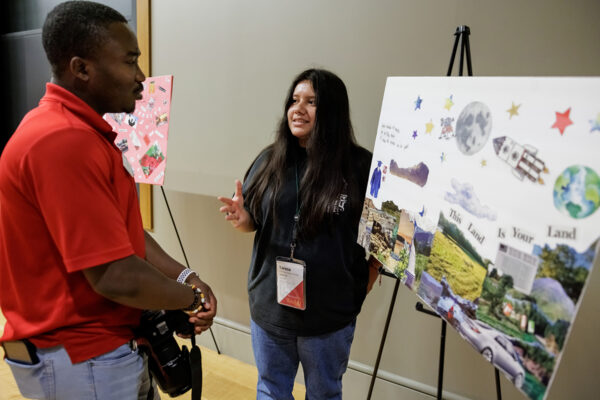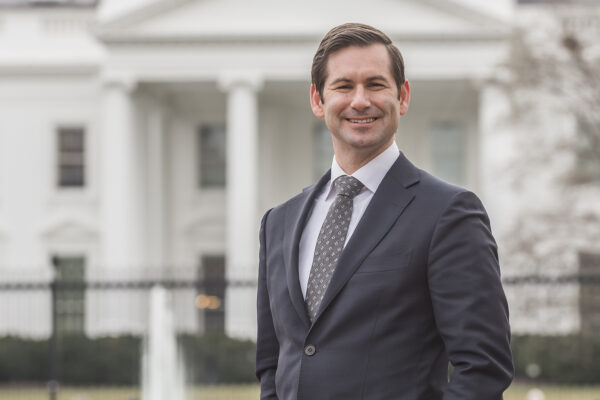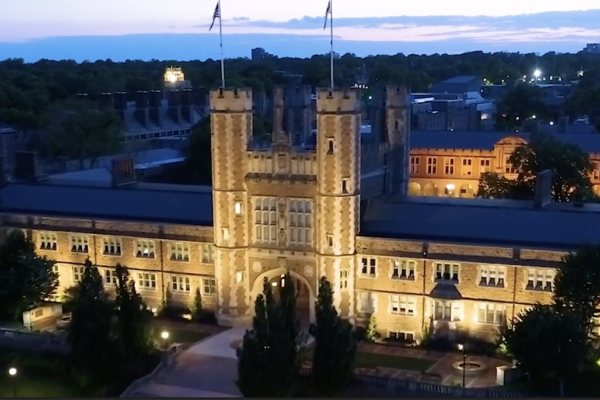“I am from small towns, corn fields, big trucks, no stoplights, and driving an hour to get to the closest Walmart.
I am from a big family, all of whom don’t say they love you unless you play the sports they like.”
So begins the “I am from” poem of Katie Feeney, a rising senior at Washington University in St. Louis and a native of Memphis, Mo., a small town on the state’s northern border. For a week in July, Feeney served as a student ambassador for the university’s inaugural Rural Scholars Academy, a new program to introduce talented high school juniors from rural communities in Missouri and southern Illinois to life at WashU and St. Louis. The cohort of 22 students lived in Umrath House, took a class with Sam Fox School of Design & Visual Arts faculty and learned the ins and outs of the college application process. They also made new friends, wrote their own “I am from” poems, ate barbecue on South 40 and cheered on the Cardinals at Busch Stadium.
“These students are really smart and they came here with a lot of questions: ‘What makes a good college essay? How does my family’s farm affect my financial aid? What’s it like to go to school here?’” said Feeney, who is studying biomedical engineering at the McKelvey School of Engineering. “Growing up in a small town, you don’t necessarily know a lot of people who went away to a school like WashU. Hopefully, these scholars are going home knowing more about their opportunities.”

Scholar Bella Woolsey certainly did. Raised on a cattle farm in Summersville, Mo. (pop. 461), Woolsey is at the top of her class and a leader for her school’s FFA chapter. She plans to be a doctor and wants to study chemistry at WashU — a dream that now seems within reach after she learned about WashU’s holistic review process.
“Our school doesn’t have AP or IB courses, so I can’t take some of the classes students in big cities or private schools can,” Woolsey said. “That worried me. It was really good to hear that WashU is looking at the whole student and cares about students from rural towns.”
The Rural Scholars Academy is part of the Heartland Initiative, WashU’s effort to better recruit and support rural students from Missouri and southern Illinois. Supported by alumna and emerita trustee Joyce Buchheit and her husband, Chauncy Buchheit, the initiative also funds two admissions officers who are dedicated to visiting rural high schools and college fairs. Washington University also is a founding member of the Small Town and Rural Students (STARS) College Network.
Dacoda Scarlett, associate director of undergraduate admissions, and his team, Philip Layfield and Lia Garofolo, both assistant directors of undergraduate admissions, will meet with hundreds of rural students this year. Their message to Rural Scholars Academy participants? Yes, grades matter, but leadership, commitment and character count, too.
“The reason why we are here is because WashU really values diversity and wants people who think differently,” Layfield told the scholars. “Your stories are interesting. Tell them to us.”

Layfield also told scholars about the WashU Pledge, which provides a free undergraduate education to admitted Missouri and southern Illinois students who are Pell Grant-eligible or from families with annual incomes of $75,000 or less. The WashU Pledge covers the full cost of tuition, housing and fees.
“Did you hear that? Free,” Feeney jumped in. “I wouldn’t be here without the WashU Pledge. It’s fantastic.”
On the academy’s final day, Ronné Turner, vice provost for admissions and financial aid, met scholars and their parents and urged them to stay in touch. WashU, she said, would be there to answer their questions no matter where they ultimately applied.
“These students proved what we already knew — there are many curious, thoughtful and hardworking students right here in our backyard,” Turner said. “I’m so grateful that I got to know them better, and I’m thrilled they got to know WashU better, too.”



